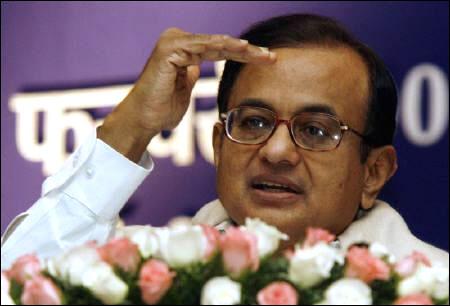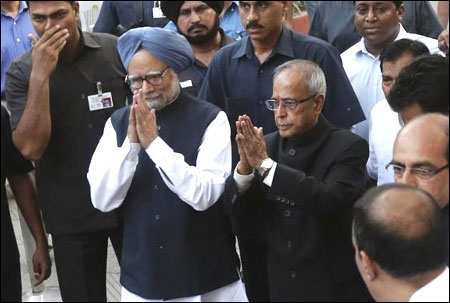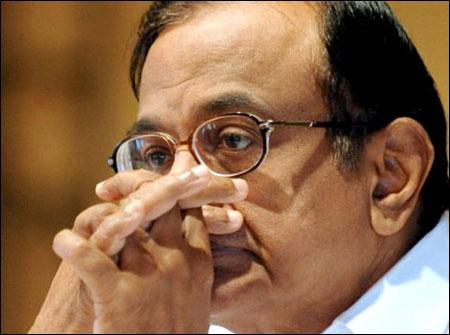Photographs: B Mathur/Reuters Aditi Phadnis in New Delhi
In 2011, Business Standard, in an interview, asked P Chidambaram what aspect of the economy kept him awake at night. "The interplay of high inflation and slow growth," he replied without hesitation. "Our goal must be high growth with moderate inflation. So, in a situation in which inflation is high and growth may be slowing, we should worry".
How could this be set right? There is no magic bullet, he said. "It has to be done through appropriate fiscal and monetary policies, which the government is trying to do."
He provided a bit of history. "The fact is low growth and high inflation are not problems new to India. In 1991, Manmohan Singh had the same problem. We had to bring in investment. He slashed expenditure sharply and cut the Budget brutally. While that may not apply in 2011, the problem is the same."
Nothing has changed. In 2012, as Chidambaram returns to the finance ministry, he has to grapple the same demons, and a few more.
Click on NEXT for more...
Can Chidambaram revive the Indian economy?
Photographs: Reuters
Chidambaram understands the challenge better than anyone else. He revels in tackling these. But he also knows the perils of venturing out to slay dragons without being prepared.
So, before he was named finance minister, he met Prime Minister Manmohan Singh and told him he didn't want the job unless he was empowered to take tough decisions.
This meant treading on political toes on the sensitive issue of cutting subsidies and ending some gravy trains.
When the PM's Economic Advisory Council chief, C Rangarajan, told the PM Chidambaram would be the best person for the finance minister's job, Singh replied he was preaching to the converted.
"We think alike. We are on the same wavelength," he said about Chidambaram.
Can Chidambaram revive the Indian economy?
Photographs: Adnan Abidi/Reuters
Manmohan Singh desperately needs a finance minister on the same wavelength, because the previous one wasn't. A finance minister typically meets the prime minister at least twice before presenting the Budget, to run key proposals past him.
When Pranab Mukherjee, primed by his bureaucrats, took the Budget papers to the PMO, he was ready to do battle over two potentially controversial issues: The retrospective tax on foreign companies that acquired assets in India; and on General Anti-Avoidance Rules (GAAR) that would give extraordinary powers to tax department officials.
If the PM was horrified, he tried not to show his feelings. He tried to tell the finance minister this was not the time to introduce such measures. "I have made up my mind," Mukherjee said with an air of finality, and days later, unveiled a Budget that had the same effect on investors as the Indian nuclear tests of 1998 had on the world.
Click on NEXT for more...
Can Chidambaram revive the Indian economy?
Photographs: Reuters
Will Chidambaram reverse some of his predecessor's Budget provisions? Probably not, though judging by his earlier statements, he would very much like to.
In 2011, in the context of trade, for example, he said: "We must always be on guard against creeping controls. Some controls tend to find their way through the back door.
The control mindset will always try to smuggle in something that would ostensibly 'help exporters'. The idea must be to prepare the country for freer trade. The restrictions still exist in the shape of anti-dumping duties, safeguard duties, non tariff barriers.
Not just India, every country in the world has those. But the battle is for freer trade. All countries must dismantle barriers. As an economy matures, it must become more competitive, more efficient, and it must shed the last barrier to freer trade".






article